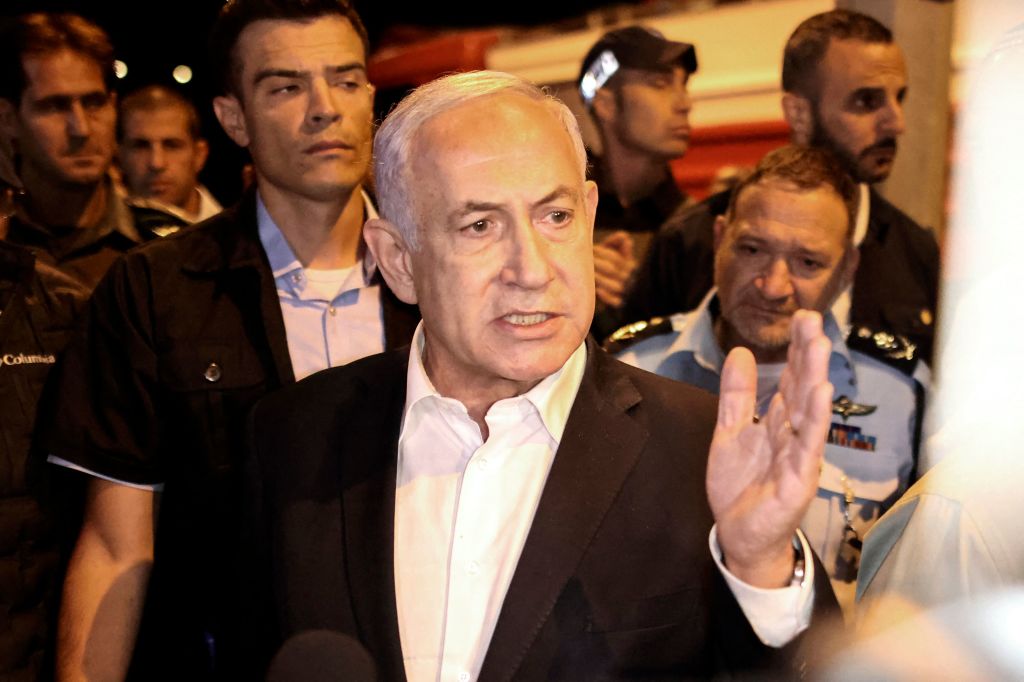Huwara is a Palestinian town in the heart of the Shomron, the mountainous northern portion of the territory Israel refers to as Judea and Samaria and the world knows as the West Bank. Huwara is smouldering today after a night of rioting and fire-setting by Israeli residents. On Sunday, two Israelis, brothers Hallel and Yagel Yaniv, 21 and 19 years old, from the nearby Israeli settlement of Har Bracha, were murdered by a Palestinian gunman. They were travelling through Huwara when they were gunned down at point-blank range while sitting in traffic. Their mother Esti said: ‘We have a huge hole in our hearts. Nothing will close that hole, not settlement construction, not a protest – nothing.’
Some settlers listened to other voices. Last night, dozens of young Israeli men from surrounding communities descended on Huwara and set fire to homes and cars. The Israeli army was forced to enter Huwara to rescue the Palestinian residents from the Israeli mob. One Palestinian is reported to have died, though it is unclear whether he was shot by Israeli soldiers or settlers. (There are conflicting reports as to whether he was killed in Huwara itself or in the neighbouring community of Za’tara.) Palestinian political factions and mosques issued calls for Arabs to confront the settlers, while Palestinians reportedly set fire to Kever Yosef, a Jewish holy site located in the Palestinian city of Nablus, just south of Huwara. Violence has been reported throughout the West Bank, as well as on the boundary with Gaza.
Attacks on Palestinians by Israeli settlers, and vice versa, are nothing new, nor is extremist rhetoric. No one could have been surprised when Davidi Ben-Zion, deputy head of the Samaria Regional Council, said in response to the Yaniv murders: ‘The village of Huwara must be erased, this place is a terror nest, and the punishment has to be on everyone.’ Such talk is becoming more common as tensions intensify in the West Bank, where Palestinian terror activity has been rising over the past year or so along with increased tactical operations by the Israel Defence Forces (IDF).
The real deterioration comes in the number of Israeli government legislators willing to openly cheer on the riots. Ben-Zion’s ‘erase’ tweet was ‘liked’ by Israel’s finance minister Bezalel Smotrich, who later had to issue a statement disavowing violence. Zvika Fogel, a member of the far-right Otzma Yehudit party and chair of the Knesset’s national security committee, commented: ‘A closed, burnt Huwara – that’s what I want to see. That’s the only way to achieve deterrence. After a murder like yesterday’s, we need burning villages when the IDF doesn’t act.’ Fellow Otzma MK Limor Son Har-Melech turned up in Huwara last night to ‘support the righteous cry of hundreds of Samaria residents who came out to protest and demand security’.
Prime Minister Benjamin Netanyahu appealed for calm and urged Israelis not to take the law into their own hands. He would have a touch more credibility if he hadn’t invited into his governing coalition the very people egging on vigilante reprisals. The unrest in the West Bank predates Netanyahu’s return to power but his government has no evident strategy for reducing the threat beyond rhetoric and striking populist poses over the death penalty. The emergence of terror groups like the Lion’s Den and the uptick in attacks by Palestinians unaffiliated to any of the main factions will not be reversed by tough-sounding words.
The attack on Huwara shames the settlement movement in its disregard for Palestinian life and its racist logic that all Palestinians bear responsibility for the actions of some of their number. The veneration of terrorism in Palestinian society is cruel, wicked and self-harming but it does not justify the actions taken by some settlers last night.
Nothing that happens between the River Jordan and the Mediterranean Sea is self-contained. Each action spurs a reaction, each outrage inspires a fresh monstrosity. Since the start of the year, 12 Israelis have been killed in Palestinian terrorist attacks, with the victims ranging in age from six to 68. In the same time, more than 60 Palestinians have died, and while most met their end while committing a terrorist act or in gunfights with Israeli police or soldiers, a number of civilians have been killed in the crossfire.
These figures are juxtaposed not to suggest equivalence. Terrorism and counter-terrorist operations do not exist in the same moral category. They are juxtaposed because for the past year analysts have been asking the same question: Are we on the brink of a third Intifada? Huwara and dozens of other incidents suggest the brink may already be behind us.







Comments